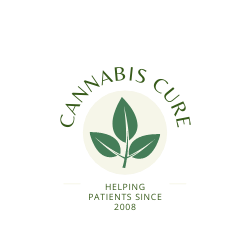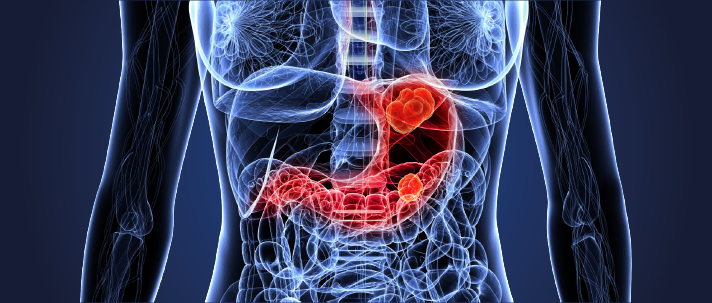Stomach Cancer
Although stomach cancer is relatively rare in the UK, it’s risky because it’s difficult to diagnose. Stomach cancer, also known as gastric cancer, occurs when cancer cells grow in the stomach lining. They tend to develop slowly and don’t create noticeable symptoms so the cancer is often discovered when it’s spread to other parts of the body. There have been recent developments into the cause of stomach cancer and a study released in 2020 by researchers at Seoul National University Bundang Hospital found that there is a mutation in a specific gene in the gastric mucosa membrane layer that causes gastric cancer patients among family members. The research team studied 112 people in 14 families with two or more members with gastric cancer and found that mutations in the Mucin 4 (MUC4) gene, which produces the mucus in the gastric mucosa, may affect gastric cancer development.
What Are The Symptoms?
Unfortunately, there aren’t many early symptoms but advanced ones include frequent heartburn or acid reflux, problems swallowing, symptoms of indigestion, such as burping a lot, nausea and vomiting, loss of appetite, sudden weight loss, feeling full quickly, constant bloating, blood in stools, excessive fatigue, jaundice, stomach pain, which can increase after eating, and a lump or pain at the top of your stomach.
What Are The Risk Factors?
Certain diseases and conditions may increase your risk of developing stomach cancer including stomach polyps (abnormal growths of tissue that form on the lining of the stomach), h.pylori bacterial infections that cause ulcers, lymphoma (a group of blood cancers), tumours in other parts of the digestive system, and inflammation in your gut called gastritis. Certain lifestyle factors can also increase the risk, including individuals who smoke, are overweight, eat a lot of salty or processed foods or too much meat, have a history of alcohol excess, and those with inactive lifestyles. Stomach cancer is also more common among people over 50 years old, those with a family history of the disease, and people of Korean, Mongolian, Japanese, and Chinese descent.
How Can Medical Cannabis (RSO) Help?
To date, scientific research on how cannabinoids – naturally occurring chemical compounds – in medical cannabis can treat cancer has almost entirely taken place in a laboratory or in animal models, which means medical trials on humans are necessary.
What we do know is that the body naturally produces cannabinoids, like the cannabis plant, which are called endocannabinoids (from ‘endogenous’ which means ‘growing or originating within an organism’).
Our endocannabinoid system is responsible for maintaining homeostasis within the body and regulates a variety of functions including sleep, digestion, pain, memory, fertility, inflammation, mood, and cognition. Our endocannabinoids bind to endocannabinoid receptors, of which there are two types: CB1 receptors, which are in the brain and central nervous system, and CB2 receptors, which are in the immune system. Enzymes then break down endocannabinoids once they’ve carried out their intended function to continue homeostasis.
When our endocannabinoid system becomes deficient – when the body isn’t correctly making endocannabinoids, if there aren’t enough receptors, if there is an overabundance of enzymes, or if there isn’t adequate communication between our endocannabinoids and receptors – we experience health problems like stress, insomnia, illness, and disease, including cancer. Ingesting medical cannabis allows the plant’s cannabinoids to mimic the natural compounds in our body and bind to our CB1 and CB2 cannabinoid receptors, helping the body function properly again.
A mix of studies listed in the journal Nature Reviews Cancer describes the effects medical cannabis has had on cancer cells in the lab, which include:
- Triggering cell death, through a mechanism called apoptosis
- Stopping cells from dividing
- Preventing new blood vessels from growing into tumours
- Reducing the chances of cancer cells spreading through the body, by stopping cells from moving or invading neighbouring tissue
- Speeding up the cell’s internal ‘waste disposal machine’ – a process known as autophagy – which can lead to cell death
It even appears that cannabinoids can exert effects on cancer cells that don’t involve cannabinoid receptors, but this remains a vague area.
If you’re opting for the conventional medicine route, which typically includes chemotherapy and radiation, medical cannabis can also soothe side-effects that include fatigue, nausea, appetite loss and pain, and more, helping you regain a quality of life again.
How Can Medical Cannabis Directly Affect Stomach Cancer Tumours?
A 2013 study conducted by the Catholic University of Korea, College of Medicine, and published in the journal Anticancer Research, found that a synthetic version of the cannabinoid THC effectively slowed the growth of tumour cells in mice models of gastric cancers. The cancer cells used in the study were from a type of cancer that is resistant to a common chemotherapy drug Fluorouracil. In a 2019 study published in Cell Death and Disease, the researchers assessed the effectiveness of CBD on various types of stomach cancer cells in the laboratory and in mice. The CBD treatment in the laboratory showed decreased cell proliferation and increased cell death in some, but not all, stomach cancers. The researchers found that the mice experienced less tumour growth when treated with CBD.
Further Reading
How and where to safely buy RSO medical cannabis oil online
Help and Advice
If you need advice or help with Medical Cannabis and RSO, please use the contact form provided. We try to answer all emails within 24 hours and are happy to help and advise on all aspects of Medical Cannabis treatments in complete confidence.
Disclaimer: Please note that whilst we consider ourselves subject matter experts regarding Medical Cannabis, we are not medical professionals. We are a Medical Cannabis information resource, educating and helping those in need. Whilst we are very strong believers in the benefits of Medical Cannabis, there is still limited evidence that Medical Cannabis can treat/cure all the illnesses we discuss on our website. We recommend you do as much research as possible, and where practical seek professional medical advice before proceeding with Medical Cannabis oil.

